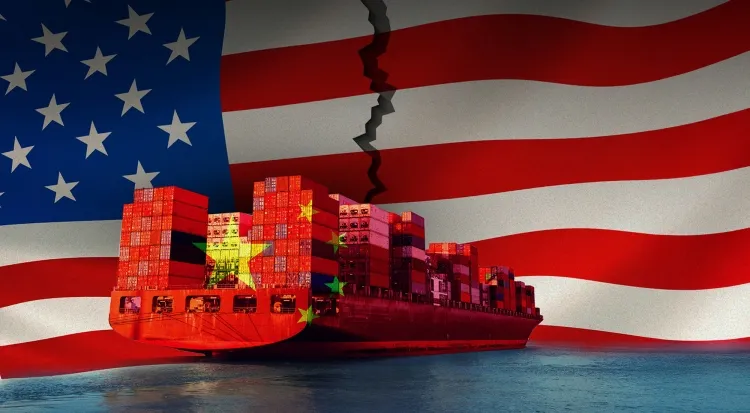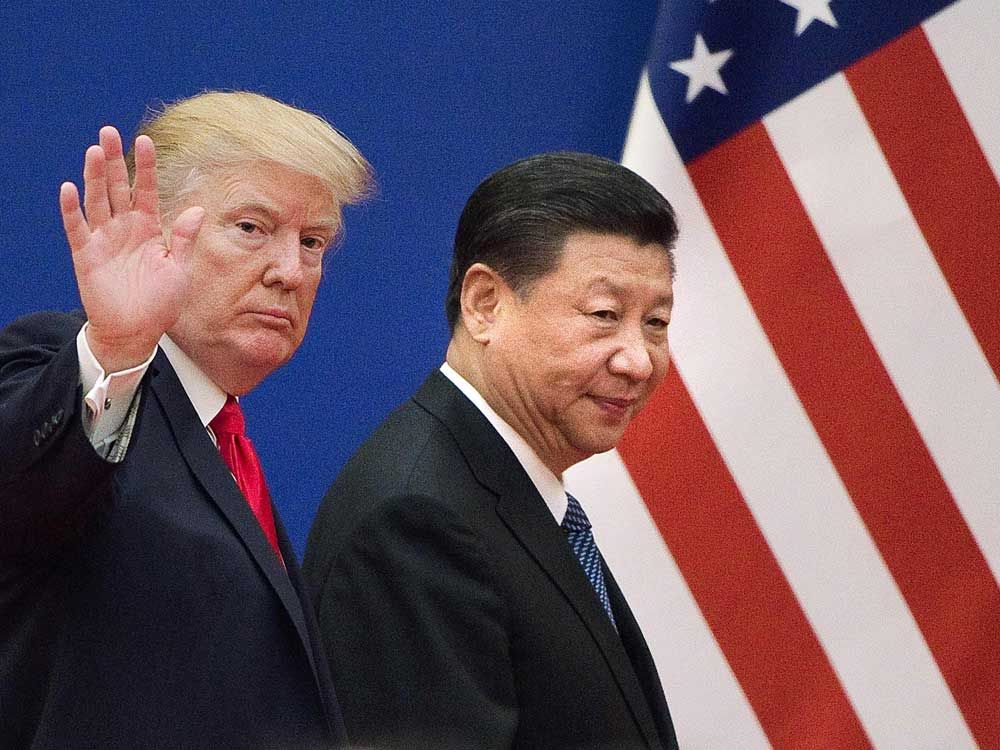Trade War Between U.S. and China Escalates Amid Retaliatory Tariffs and Economic Tensions
The trade war between the United States and China, ignited by President Donald Trump’s aggressive economic policies, has continued to intensify, with both nations leveraging tariffs and other measures to exert pressure on one another. Trump’s administration initially imposed 25% tariffs on Canadian and Mexican goods, while China faced slightly lower tariffs of 10% on its imports. However, Beijing quickly responded with a 15% tariff on American goods, signaling a deepening trade conflict between the two economic giants.

Trump’s Dismissal of Chinese Retaliation
Despite the growing tensions, President Trump downplayed the impact of China’s retaliatory tariffs, maintaining that the U.S. would come out on top in this trade war. Trump also dismissed the importance of an imminent phone call with Chinese President Xi Jinping, expressing no urgency to engage in discussions. When asked about the timing of his conversation with Xi, Trump responded, "We'll speak to him at the appropriate time. I'm in no rush." This response highlights the president’s stance that the U.S. would not rush to make concessions or seek immediate resolutions, maintaining a posture of strength against China.
Trump’s assertion that the U.S. is poised to perform well against China in the trade war is also supported by his claim that China is investing heavily in building its military infrastructure. According to U.S. government data, America’s trade deficit with China stood at $270 billion in 2024, a slight decrease from the $279 billion deficit in 2023. While this marks a small improvement, the U.S. deficit with China reached a record high of $418 billion in 2018, the year Trump launched the trade war.
China’s Response: Protecting Its Interests

In response to Trump’s tariffs, China has called for open dialogue and emphasized that its countermeasures are a necessary defense of its legitimate rights and interests. The Chinese government views the U.S. actions, particularly the tariffs, as unjustified and as a form of economic suppression. Chinese officials argue that the U.S. has used issues such as the fentanyl crisis as a pretext for its tariffs, while accusing Washington of engaging in unfair trade practices.
China firmly opposes the U.S. measures, with Chinese Foreign Ministry spokesperson Nana stating that "trade wars and tariff wars have no winners" and urging the U.S. to correct its actions. Nana emphasized the importance of resolving disputes through "equal-footed consultation" to foster stable and sustainable development in U.S.-China relations.
Additionally, China has signaled its intention to strengthen its economic position in the trade war by taking steps to safeguard its currency and critical industries. The People’s Bank of China recently set the yuan’s fixing rate at 7.16 per U.S. dollar, a move aimed at maintaining the stability of China’s currency in the face of external pressures.
China’s Strategic Moves: Currency and Export Control
As part of its broader economic strategy, China has also taken measures to defend its interests in key areas such as e-commerce and critical mineral resources. The U.S. Postal Service’s suspension of parcels from China and Hong Kong, an action that could significantly impact e-commerce platforms like Tmall and Shein, is seen as a direct attempt to suppress Chinese economic growth. In response, China has added key minerals such as tungsten, thorium, bismuth, and indium to its export control list. These minerals are crucial to various industries, including electronics and defense, and China’s decision to restrict their export could have far-reaching consequences for global supply chains.
In addition to these measures, China has initiated an anti-monopoly investigation into major U.S. tech companies, including Google. This move signals that China is not only prepared to defend its economic interests but is also positioning itself as a formidable player in the ongoing trade war. The investigation into U.S. tech giants further underscores China’s commitment to taking strong actions to protect its industries from foreign influence and competition.
The Broader Implications of the Trade War
The ongoing trade war between the U.S. and China is not just a bilateral dispute but a broader geopolitical struggle that could shape the future of global trade and economics. The tariffs, export controls, and retaliatory measures have already disrupted global markets, and further escalation could lead to more significant economic ramifications.
The trade deficit between the two nations remains a contentious issue, with both sides accusing each other of unfair practices. Trump’s strategy of imposing tariffs on Chinese imports was designed to bring China to the negotiation table, but the impact of these measures on American consumers and businesses has been a topic of debate. Meanwhile, China’s retaliation, including the suspension of U.S. e-commerce shipments and the export controls on critical minerals, is a clear indication that Beijing is willing to take bold actions to level the playing field.
In the long term, the outcome of the U.S.-China trade war could redefine the global economic landscape. Both nations are deeply intertwined in the global supply chain, and their economic policies will have ripple effects across other countries. While the U.S. seeks to reassert its dominance, China is positioning itself as a global leader capable of influencing key industries and markets.
Looking Ahead: Diplomatic Solutions or Continued Confrontation?
The road ahead remains uncertain. While Trump has expressed confidence that the U.S. will come out victorious, the trade war continues to create economic turbulence for both countries. It remains to be seen whether diplomatic solutions or continued confrontation will shape the future of U.S.-China relations.
For now, China’s response to U.S. tariffs and sanctions demonstrates its determination to defend its interests, while also signaling that it is prepared for a protracted economic struggle. As the trade war continues to evolve, the international community will be closely monitoring developments, particularly in areas such as technology, currency stability, and global supply chains.
Both the U.S. and China have much at stake, and their actions in the coming months will likely have lasting implications for the global economy.
What's Your Reaction?














